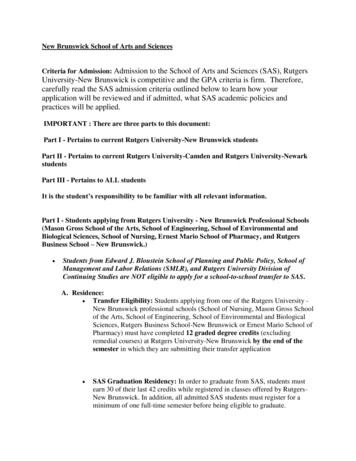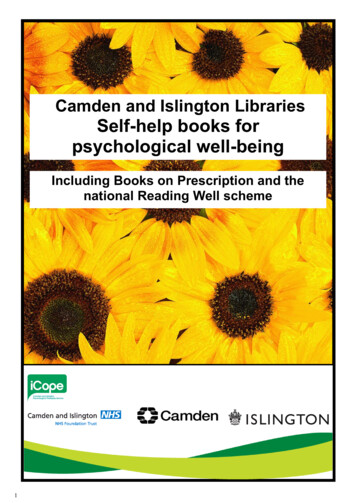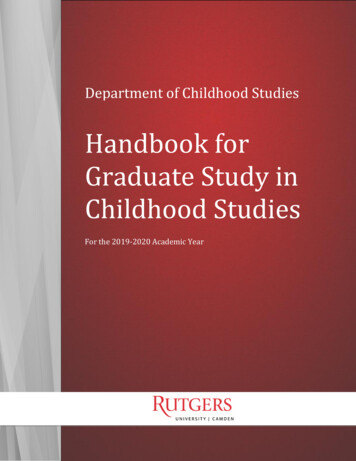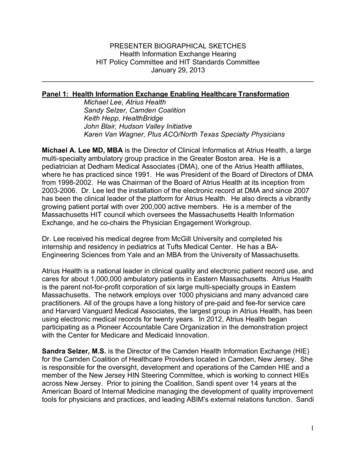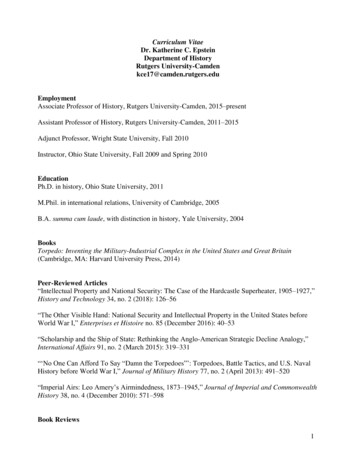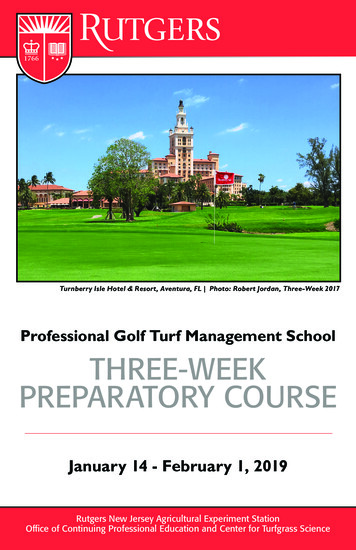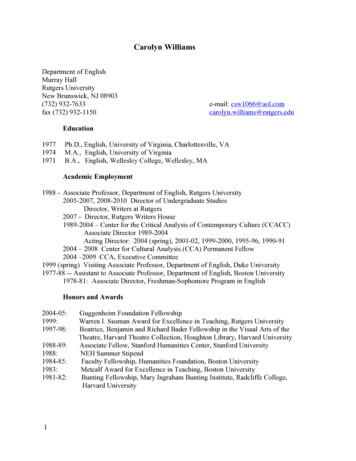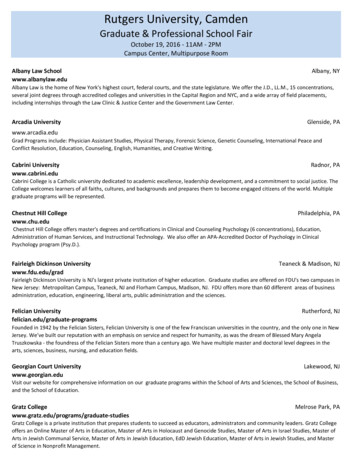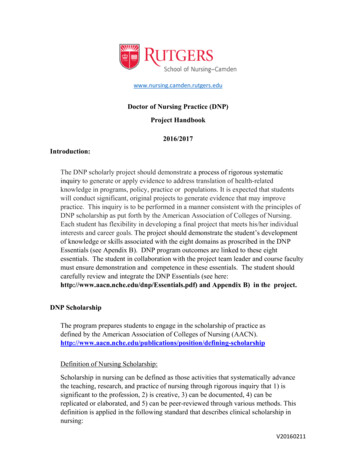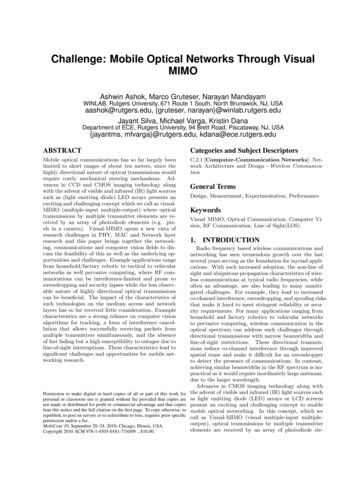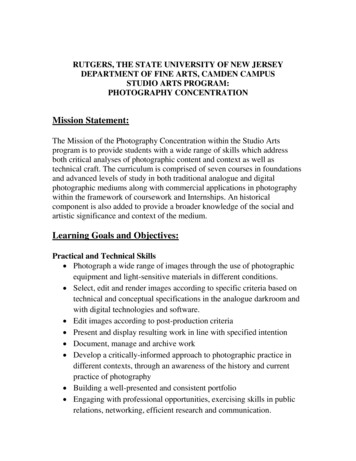
Transcription
RUTGERS, THE STATE UNIVERSITY OF NEW JERSEYDEPARTMENT OF FINE ARTS, CAMDEN CAMPUSSTUDIO ARTS PROGRAM:PHOTOGRAPHY CONCENTRATIONMission Statement:The Mission of the Photography Concentration within the Studio Artsprogram is to provide students with a wide range of skills which addressboth critical analyses of photographic content and context as well astechnical craft. The curriculum is comprised of seven courses in foundationsand advanced levels of study in both traditional analogue and digitalphotographic mediums along with commercial applications in photographywithin the framework of coursework and Internships. An historicalcomponent is also added to provide a broader knowledge of the social andartistic significance and context of the medium.Learning Goals and Objectives:Practical and Technical Skills Photograph a wide range of images through the use of photographicequipment and light-sensitive materials in different conditions. Select, edit and render images according to specific criteria based ontechnical and conceptual specifications in the analogue darkroom andwith digital technologies and software. Edit images according to post-production criteria Present and display resulting work in line with specified intention Document, manage and archive work Develop a critically-informed approach to photographic practice indifferent contexts, through an awareness of the history and currentpractice of photography Building a well-presented and consistent portfolio Engaging with professional opportunities, exercising skills in publicrelations, networking, efficient research and communication.
Visual Literacy Perform basic analysis of photographic imagery in relation to contentand context Understand current context in relation to the history and developmentof photography Understand and apply basic visual elements and how these elementscommunicate concepts Understand subjectivity and objectivity in image analysis Understand the implications of using multiple images (series) tocommunicate specific concepts Gain insight into ethical issues of photography Demonstrate basic skills in academic research and text writing Apply creativity and insight to the taking, processing, printing andediting of photographs relative to the demands of a specific concept Effectively realize intentions through application of photographictechniques and design principles Analyze and apply knowledge of the creative, conceptual andtechnical dimensions of the work of other photographers to their ownpractice Locate their own practice as a photographer within the field ofcontemporary visual cultureProfessional Practice Observe basic ethical, legal, safety and security procedures andstandards related to working with photographic materials andequipment, and photographing in public places Demonstrate basic professional skills in interactions with others(punctuality, time management, reliability) Write and format basic professional communications (invoices andbusiness letters) and basic self-marketing material (personal bio andCV) Produce a personal development plan based on a realistic assessmentof their current position and circumstances
Observe etiquette and practical aspects of working in a studioenvironment Identify sources of finance and funding for the development andrealization of a body of independent creative work Understand the legal and tax implications for different forms ofbusiness entity, and identify an appropriate business entity for theirfuture practice as a photographer Demonstrate insight into the ethical implications of their practice as aphotographerMethods of Assessment:Assessment is focused on ensuring that the student is able to acquire theskills and knowledge needed to be a photographer, both in the artistic andcommercial contexts. Weekly “Assessment Focus” sessions, along withobservation and demonstration by faculty and students, are utilized to ensurestudents have grasped all of the various conceptual, technical and practicalskills they have been exposed to in any given week. These assessmentsprovide an opportunity for the student to receive constructive and honestfeedback on the strengths and weaknesses of their work. Group critiques arealso a vital function in the assessment process.Assignments that bring together a wide range of creative, conceptual,technical and professional skills are the main structure of the Photographiccurriculum. Independent study and internships follow the structuredassignment driven frameworkFor final assessments, students are required to produce a body of work inorder to demonstrate their grasp and integration of skills outlined above.This body of work must be presented in portfolio format, and participation inthe “Thesis” exhibition. Portfolios and exhibition are required to beaccompanied by written tasks aimed at demonstrating a student’s grasp ofthe professional practice and visual literacy aspects of the program.
Assessment Schedule:Freshman Year:Students are admitted into the Department of Fine Arts PhotographyProgram by self selection. If they meet the entrance requirements of theuniversity, they may elect to become an art major in the Studio Arts Area ofSpecialization with a Photography Concentration. The first two years of corecourses are intended as Foundations, not electives. Students are required tocomplete 080-102, 080-103, 080-213, 080-221, 080-264, 080-351, and 080381 or 080-211, and the completion of, or concurrent enrollment in ArtHistory Surveys 082-101, and 082-102, before they apply for SophomoreReview.Note: A minimum of 15 Studio Art credits must be taken at Rutgers,Camden. Transfer students must consult the chair of the department prior toenrollment for portfolio evaluation.Transfer students with Foundations requirement deficiencies must completecourse deficiencies no later than two semesters following entry into theprogram.Sophomore Year: Sophomore Review AssessmentAll Studio Art majors with a Photography Concentration must apply for aSophomore Review at the end of their fourth semester in the program. Thereview involves specific measures of Foundation studies competencies toinclude the following:1.evaluation of research papers written in Art History Surveys 082101 and 082-102.2.review of portfolios prepared for the Sophomore Review.The Department of Fine Arts Assessment Committee will also implementindirect measures of Foundation Studies student competencies. These willinclude a record of student competitive activity and alumni surveys.The evaluation of assessment material will be implemented by the DFAAssessment Committee. This committee will be comprised of one facultymember from each major area of study within the department: Art History,Studio Art, and Electronic Art. Faculty review teams will evaluate data from
each of the measuring instruments. This committee will also monitor theassessment process and make recommendations for modifications to theassessment procedure.Upon successful completion of the Sophomore Review students may beginadvanced study in the following Photography Concentration curriculum.50:080:261 Photography I (3), 50:080:265 Digital Photography II (3),50:080:460 Advanced Photography (3), 50:080:461 Studio and CommercialPhotography (3), 50:082:383 History of Photography (3), Credits inIndependent Study, Internship, or Special Studio Project at 300 level orhigher (3). Additional credits in Art History(3).Recommended: Pro Art Practices, Contemporary ArtJunior Year: Advanced Studio Portfolio ReviewThe Advanced Studio Art Portfolio Review provides faculty with anopportunity to view junior level work from the Photography Concentration.Specialization area faculty (sculpture, painting, and photography), meetduring the second junior semester to question the aesthetic direction ofstudent work presented for review. Progress in meeting all of the coursework required for senior level studio projects is also reviewed.Junior & Senior Year: Internship ReviewsSelected students may participate in Internships. Photography interns areprovided with professional learning experiences both on and off campusproviding mentor evaluation of performance that enhances the range ofreview for students. The grades submitted for this course work are madeafter consultation with the on or off-campus sponsors of the internshipexperiences.Senior Year: Assessment DevelopmentThe Studio Art area faculty may consider the possibility of requiring a seniorCapstone Studio Project along with participation in the required Thesisexhibition in the final semester of senior year. The Capstone requirementwould allow for a more comprehensive assessment of individual studentachievement by allowing the presentation of a more complete body of workthan is normally included in the group Thesis exhibition.
Post Degree Assessment: Alumni SurveyThe development of an alumni survey would provide much needed feedbackfrom our arts alumni. The survey would be sent to all art alumni to obtaininformation on their career development and their opinion of the RutgersUniversity Camden arts education in meeting their career goals.
Note: A minimum of 15 Studio Art credits must be taken at Rutgers, Camden. Transfer students must consult the chair of the department prior to enrollment for portfolio evaluation. Transfer students with Foundations requirement deficiencies must complete course deficiencies no later than two semesters following entry into the program.
